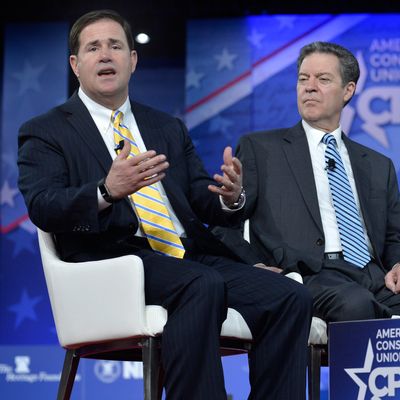
In the accounting of Republicans who have various issues with the American Health Care Act, a.k.a Trumpcare, a.k.a. RinoCare, a.k.a. Obamacare 2.0, one important group that you might miss or misunderstand is Republican governors. According to a report in Politico, the number of GOP governors who have “expressed strong support” for their party’s plan is exactly zero, while 15 have voiced varying concerns.
You might think the kvetching governors are all upset about the Medicaid cuts in the bill which will affect beneficiaries in states that accepted the Affordable Care Act’s Medicaid expansion beginning in 2020. And that’s true of some. Others, however, are conservatives who agree with some of their counterparts in Washington that the plan is too much like Obamacare.
But something they probably all agree on involves the long-term trajectory of Medicaid, in which federal allotments to the states will be limited by a per capita cap. In the long history of proposals for these kind of limitations on federal responsibility for Medicaid, the idea has always been to ask states to take on more fiscal responsibility for beneficiaries in exchange for getting maximum flexibility in dealing with the program’s requirements and procedures. Unfortunately for governors, AHCA has the spending cuts without the flexibility.
As Health Affairs notes, AHCA may actually be more prescriptive than the status quo, micromanaging several types of beneficiaries the authors do not want to receive coverage (e.g., lottery winners, the undocumented, those with home equity over a certain amount), without some general grant of flexibility.
Yes, there is some flexible money in the form of $2 billion a year for five years to be distributed to states that did not expand Medicaid; it’s kind of a consolation prize, amounting to far less than these states would have received by pursuing the expansion. But in general, the sought-after flexibility isn’t there:
The combination of federal funding reductions and the retention of the program’s comprehensive legal requirements would, in effect, create a perfect storm for states. While it is possible that some of these requirements could be eased by the Trump Administration using its section 1115 waiver authority, section 1115 is actually a limited research and demonstration statute, not a tool for wholesale statutory re-design simply to create new state flexibility. Furthermore, certain Medicaid provisions, such as premium and cost-sharing rules, are by and large excluded from the scope of 1115.
The GOP governors have noticed this disrespect from the authors of AHCA:
“Flexibility” has become a buzzword among governors critical of the bill. Baker, Snyder, Arizona’s Doug Ducey, Tennessee’s Bill Haslam, Wisconsin’s Scott Walker and Nevada’s Brian Sandoval say there is work to be done on the bill to ensure it grants the states the flexibility they need.
“The plan that was released doesn’t reflect what the governors want, which is flexibility,” Ducey told a local radio station in Phoenix. “I want flexibility at the state level to improve our health care system, to make these reforms. This is still prescriptive from Washington, D.C.”
It is often a problem that Republicans pay lip service to the concept of letting states set their own policies, but only extend that support when states do what they want. That’s what people in states that have legalized recreational marijuana use fear could be the case with War on Drugs throwback Jeff Sessions in charge of the Justice Department.
So for the time being, you can add state-level Republicans to the growing ranks of those who aren’t exactly jazzed about the American Health Care Act. Doing more with less at the direction of the federal government is not what they expected of a GOP administration and a GOP Congress.






























